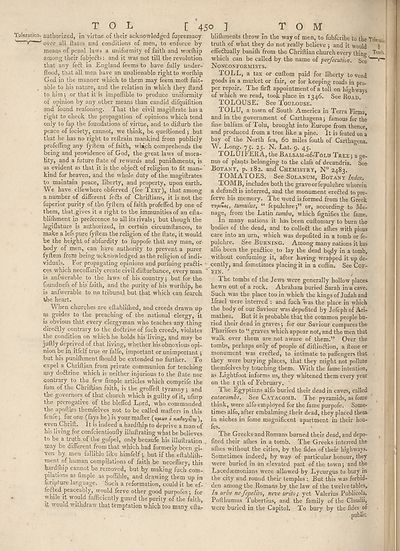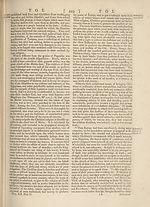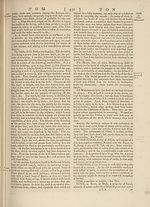Encyclopaedia Britannica, or, a Dictionary of arts, sciences, and miscellaneous literature : enlarged and improved. Illustrated with nearly six hundred engravings > Volume 20, SUI-ZYM
(500) Page 450
Download files
Complete book:
Individual page:
Thumbnail gallery: Grid view | List view

T O L [ 450 ] TOM
Tpleraticn.
authorized, In virtue of their acknowledged fupremacy
over all ftates and conditions of men, to enforce by
means of penal laws a uniformity of faith and worfhip
among their fubjefts: and it was not till the revolution
that any fe£t in England feems to have fully under-
flood, that all men have an unalienable right to worfhip
God in the manner which to them may feem moft fuit-
able to his nature, and the relation in which they fland
to him 5 or that it is impoffible to produce uniformity
of opinion by any other means than candid difquifition
and found reafoning. That the civil magiflrate has a
right to check the propagation of opinions which tend
only to fap the foundations of virtue, and to diflurb the
peace of fociety, cannot, we think, be queftioned j but
that he has no right to reflrain mankind from publicly
profefling any lyftem of faith, which comprehends the
being and providence of God, the great laws of mora¬
lity, and a future date of rewards and punilhments, is
as evident as that it is the obje£t of religion to fit man¬
kind for heaven, and the whole duty of the magiftrates
to maintain peace, liberty, and property, upon earth.
We have elfewhere obferved (fee Test), that among
a number of different fe&s of Chriftians, it is not the
fuperior purity of the fyftem of faith profeffed by one of
them, that,gives it a right to the immunities of an effa-
hlifhment in preference to all its rivals j but though the
legiflature is authorized, in certain circumilances, to
make a lefs pure fyftem the religion of the ftate, it would
be the height of abfurdity to fuppofe that any man, or
body of men, can have authority to prevent a purer
fyftem from being acknowledged as the religion of indi¬
viduals. For propagating opinions and purfuing pradii-
ces which necefiarily create civil difturbance, every man
is anfwerable to the laws of his country; but for the
foundnefs of his faith, and the purity of his worfhip, he
is anfwerable to no tribunal but that which can fearch
the heart.
When churches are eftablifiied, and creeds drawn up
qs guides to the preaching of the national clergy, it
is obvious that every clergyman who teaches any thing
diredtly contrary to the dodtrine of fuch creeds, violates
the condition on which he holds his living, and may be
juftly deprived of that living, whether his obnoxious opi¬
nion be in itfelf true or falfe, important or unimportant j
but his punifhment fhould be extended no farther. To
expel a Chriftian from private communion for teaching
aay dodtrine which is neither injurious to the ftate nor
contrary to the few fimple articles which comprife the
fum of the Chriftian faith, is the groffeft tyranny, and
the governors of that church which is guilty of it, ufurp
the prerogative of the bieffed Lprd, who commanded
the apoftfes themfelves not to be called mafters in this
fenfe; for one (fays he) is your matter (t^av <5
even Chrift. It is indeed a hardftiip to deprive a man of
his living for confcientioufiy illuftrating what he believes
to be a truth of the gofpel, only becaufe his illuftration
may be different from that which had formerly been gi¬
ven by men fallible like himfelfbut if the eftablifh-
ment oi human compilations of faith be neceflary, this
hardfhip cannot be removed, but by making fuch com¬
pilations as fimple as poffible, and drawing them up in
icripture language. Such a reformation, could it be ef-
fedted peaceably, would ferve other good purpofes 5 for
while it would fufficiently guard the purity of the faith,
it would withdraw that temptation which too many efta-
bliftiments throw in the way of men, to fubfcribe to the Toleratk
truth of what they do not really believe ; and it would l|
effectually banilh from the Chriftian church every thing Tomb-
which can be called by the name of perfedition. See
Nonconformists.
TOLL, a tax or cuftom paid for liberty to vend
goods in a market or fair, or for keeping roads in pro¬
per repair. The firft appointment of a toll on highways
of which we read, took place in 1346. See Road.
TOLQUSE. See Toulouse.
TOLU, a town of South America in Terra Firma,
and in the government of Carthagena; famous for the
fine balfam of Tolu, brought into Europe from thence
and produced from a tree like a pine. It is feated on a*
bay of the North fea, 60 miles fouth of Carthagena.
W. Long. 75. 25. N. Lat. 9. 45.
TOLOlFERA, the BALSAM-of-ToLU Tree; a ge¬
nus of plants belonging to the clafs of deeandria. See
Botany, p. 182. and Chemistry, N° 2483.
TOMATOES. See Solanum, Botany Index.
TOMB, includes both the grave or fepulchre wherein
a defundl is interred, and the monument eredted to pre-
ferve his memory. The word is formed from the Greek
zvpZo;, tumulus, “ fepulchre;” or, according to Me-
nage, from the Latin tumba, which fignifies the fame.
In many nations it has been cuftomary to burn the
bodies of the dead, and to colledt the allies with pious
care into an urn, which was depofited in a tomb or fe¬
pulchre. See Burning. Among many nations it has
alfo been the pradtice to lay the dead body in a tomb,
without confuming it, after having wrapped it up de¬
cently, and fometimes placing it in a coffin. See Coe-
STN. ' ,
1 he tombs of the Jews vrere generally hollow places-
hewn out of a rock. Abraham buried Sarah in a cave.
Such was the place too in wrhich the kings of Judah and
Ifrael were interred : and fuch was the place in which
the body of our Saviour was depofited by Jofeph of Ari-
mathea. But it is probable that the common people bu¬
ried their dead in graves; for our Saviour compares the
Pharifees to “ graves which appear not, and the men that
walk over them are not aware of them.” Over the
tombs, perhaps only of people of diftindlion, a ftone or
monument was eredted, to intimate to paffengers that 1
they were burying places, that they might not pollute
themfelves by touching them. With the fame intention,
as Lightfoot informs us, they whitened them every year
on the 15th of February. '
The Egyptians alfo buried their dead in caves, called
catacombs. See Catacomb. The pyramids, as fome
think, were alfo employed for the fame purpofe. Some¬
times alfo, after embalming their dead, they placed them-
in niches in fome magnificent apartment in their hou-
fes, >
The Greeks and Romans burned their dead, and depo¬
fited their afhes in a tomb. The Greeks interred the
allies without the cities, by the fades of their highways.
Sometimes indeed, by way of particular honour, they
were buried in an elevated part of the town; and the
Lacedaemonians were allowed by Lyeurgus to bury in
the city and round their temples: But this was forbid¬
den among the Romans by the law of the twTelve tables,.
In urbe ne fepelito, neve urito; yet Valerius Publicola,
Pofthumus Tubertius, and the family of the Claudii,
were buriedi in the Capitol. To bury by the fides ot
public
Tpleraticn.
authorized, In virtue of their acknowledged fupremacy
over all ftates and conditions of men, to enforce by
means of penal laws a uniformity of faith and worfhip
among their fubjefts: and it was not till the revolution
that any fe£t in England feems to have fully under-
flood, that all men have an unalienable right to worfhip
God in the manner which to them may feem moft fuit-
able to his nature, and the relation in which they fland
to him 5 or that it is impoffible to produce uniformity
of opinion by any other means than candid difquifition
and found reafoning. That the civil magiflrate has a
right to check the propagation of opinions which tend
only to fap the foundations of virtue, and to diflurb the
peace of fociety, cannot, we think, be queftioned j but
that he has no right to reflrain mankind from publicly
profefling any lyftem of faith, which comprehends the
being and providence of God, the great laws of mora¬
lity, and a future date of rewards and punilhments, is
as evident as that it is the obje£t of religion to fit man¬
kind for heaven, and the whole duty of the magiftrates
to maintain peace, liberty, and property, upon earth.
We have elfewhere obferved (fee Test), that among
a number of different fe&s of Chriftians, it is not the
fuperior purity of the fyftem of faith profeffed by one of
them, that,gives it a right to the immunities of an effa-
hlifhment in preference to all its rivals j but though the
legiflature is authorized, in certain circumilances, to
make a lefs pure fyftem the religion of the ftate, it would
be the height of abfurdity to fuppofe that any man, or
body of men, can have authority to prevent a purer
fyftem from being acknowledged as the religion of indi¬
viduals. For propagating opinions and purfuing pradii-
ces which necefiarily create civil difturbance, every man
is anfwerable to the laws of his country; but for the
foundnefs of his faith, and the purity of his worfhip, he
is anfwerable to no tribunal but that which can fearch
the heart.
When churches are eftablifiied, and creeds drawn up
qs guides to the preaching of the national clergy, it
is obvious that every clergyman who teaches any thing
diredtly contrary to the dodtrine of fuch creeds, violates
the condition on which he holds his living, and may be
juftly deprived of that living, whether his obnoxious opi¬
nion be in itfelf true or falfe, important or unimportant j
but his punifhment fhould be extended no farther. To
expel a Chriftian from private communion for teaching
aay dodtrine which is neither injurious to the ftate nor
contrary to the few fimple articles which comprife the
fum of the Chriftian faith, is the groffeft tyranny, and
the governors of that church which is guilty of it, ufurp
the prerogative of the bieffed Lprd, who commanded
the apoftfes themfelves not to be called mafters in this
fenfe; for one (fays he) is your matter (t^av <5
even Chrift. It is indeed a hardftiip to deprive a man of
his living for confcientioufiy illuftrating what he believes
to be a truth of the gofpel, only becaufe his illuftration
may be different from that which had formerly been gi¬
ven by men fallible like himfelfbut if the eftablifh-
ment oi human compilations of faith be neceflary, this
hardfhip cannot be removed, but by making fuch com¬
pilations as fimple as poffible, and drawing them up in
icripture language. Such a reformation, could it be ef-
fedted peaceably, would ferve other good purpofes 5 for
while it would fufficiently guard the purity of the faith,
it would withdraw that temptation which too many efta-
bliftiments throw in the way of men, to fubfcribe to the Toleratk
truth of what they do not really believe ; and it would l|
effectually banilh from the Chriftian church every thing Tomb-
which can be called by the name of perfedition. See
Nonconformists.
TOLL, a tax or cuftom paid for liberty to vend
goods in a market or fair, or for keeping roads in pro¬
per repair. The firft appointment of a toll on highways
of which we read, took place in 1346. See Road.
TOLQUSE. See Toulouse.
TOLU, a town of South America in Terra Firma,
and in the government of Carthagena; famous for the
fine balfam of Tolu, brought into Europe from thence
and produced from a tree like a pine. It is feated on a*
bay of the North fea, 60 miles fouth of Carthagena.
W. Long. 75. 25. N. Lat. 9. 45.
TOLOlFERA, the BALSAM-of-ToLU Tree; a ge¬
nus of plants belonging to the clafs of deeandria. See
Botany, p. 182. and Chemistry, N° 2483.
TOMATOES. See Solanum, Botany Index.
TOMB, includes both the grave or fepulchre wherein
a defundl is interred, and the monument eredted to pre-
ferve his memory. The word is formed from the Greek
zvpZo;, tumulus, “ fepulchre;” or, according to Me-
nage, from the Latin tumba, which fignifies the fame.
In many nations it has been cuftomary to burn the
bodies of the dead, and to colledt the allies with pious
care into an urn, which was depofited in a tomb or fe¬
pulchre. See Burning. Among many nations it has
alfo been the pradtice to lay the dead body in a tomb,
without confuming it, after having wrapped it up de¬
cently, and fometimes placing it in a coffin. See Coe-
STN. ' ,
1 he tombs of the Jews vrere generally hollow places-
hewn out of a rock. Abraham buried Sarah in a cave.
Such was the place too in wrhich the kings of Judah and
Ifrael were interred : and fuch was the place in which
the body of our Saviour was depofited by Jofeph of Ari-
mathea. But it is probable that the common people bu¬
ried their dead in graves; for our Saviour compares the
Pharifees to “ graves which appear not, and the men that
walk over them are not aware of them.” Over the
tombs, perhaps only of people of diftindlion, a ftone or
monument was eredted, to intimate to paffengers that 1
they were burying places, that they might not pollute
themfelves by touching them. With the fame intention,
as Lightfoot informs us, they whitened them every year
on the 15th of February. '
The Egyptians alfo buried their dead in caves, called
catacombs. See Catacomb. The pyramids, as fome
think, were alfo employed for the fame purpofe. Some¬
times alfo, after embalming their dead, they placed them-
in niches in fome magnificent apartment in their hou-
fes, >
The Greeks and Romans burned their dead, and depo¬
fited their afhes in a tomb. The Greeks interred the
allies without the cities, by the fades of their highways.
Sometimes indeed, by way of particular honour, they
were buried in an elevated part of the town; and the
Lacedaemonians were allowed by Lyeurgus to bury in
the city and round their temples: But this was forbid¬
den among the Romans by the law of the twTelve tables,.
In urbe ne fepelito, neve urito; yet Valerius Publicola,
Pofthumus Tubertius, and the family of the Claudii,
were buriedi in the Capitol. To bury by the fides ot
public
Set display mode to:
![]() Universal Viewer |
Universal Viewer | ![]() Mirador |
Large image | Transcription
Mirador |
Large image | Transcription
Images and transcriptions on this page, including medium image downloads, may be used under the Creative Commons Attribution 4.0 International Licence unless otherwise stated. ![]()
| Permanent URL | https://digital.nls.uk/192281047 |
|---|
| Description | Plates 516, 519 and 520 missing. |
|---|---|
| Attribution and copyright: |
|
| Description | Ten editions of 'Encyclopaedia Britannica', issued from 1768-1903, in 231 volumes. Originally issued in 100 weekly parts (3 volumes) between 1768 and 1771 by publishers: Colin Macfarquhar and Andrew Bell (Edinburgh); editor: William Smellie: engraver: Andrew Bell. Expanded editions in the 19th century featured more volumes and contributions from leading experts in their fields. Managed and published in Edinburgh up to the 9th edition (25 volumes, from 1875-1889); the 10th edition (1902-1903) re-issued the 9th edition, with 11 supplementary volumes. |
|---|---|
| Additional NLS resources: |
|

